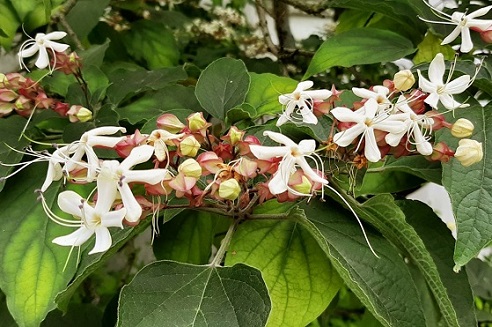Nikhil Prasad Fact checked by:Thailand Medical News Team Nov 29, 2024 1 year, 1 month, 1 day, 7 hours, 43 minutes ago
Medical News: Recent research has uncovered a promising natural treatment for respiratory syncytial virus (RSV), a common and sometimes severe respiratory infection. Scientists from Chungnam National University, the Korean Institute of Oriental Medicine, Vitabio Corporation, and other institutions in South Korea have discovered that extracts from two plants, Plantago asiatica and Clerodendrum trichotomum, can effectively inhibit RSV replication in both laboratory and animal models. This groundbreaking study sheds light on the antiviral properties of these herbal remedies and their active phytochemical component, acteoside.
 Herbal Extracts That Can Inhibit Respiratory Syncytial Virus (RSV) Replication
Herbal Extracts That Can Inhibit Respiratory Syncytial Virus (RSV) Replication
Image: The herbal plant Clerodendrum trichotomum
The Challenge of RSV
RSV is a major cause of lower respiratory tract infections, particularly in infants, young children, and the elderly. It can lead to severe illness, and reinfections are common because immunity wanes over time. While treatments like ribavirin and monoclonal antibodies exist, they are costly and primarily reserved for severe cases. This
Medical News report highlights a potential natural alternative that may pave the way for more accessible and effective treatments.
The Study and Its Findings
Researchers prepared water-soluble extracts of Plantago asiatica and Clerodendrum trichotomum using traditional methods. Laboratory tests showed that these extracts significantly reduced RSV replication in human epithelial cells, which are the primary target of the virus. The extracts also decreased RSV-induced cell death, blocked the virus's ability to form syncytia (large, infected cell masses), and reduced viral protein and RNA synthesis.
When tested in a mouse model, oral administration of the extracts led to a significant reduction in RSV levels in the lungs. These findings underscore the potential of these plant-based treatments as a natural antiviral therapy.
How the Extracts Work
The key phytochemical component responsible for the antiviral effects is acteoside, a phenolic glycoside found in both plants. High-performance liquid chromatography (HPLC) analysis confirmed the presence of acteoside in the extracts. When acteoside was isolated and tested, it showed antiviral effects similar to the complete plant extracts, further confirming its role as the active ingredient.
Acteoside demonstrated a high safety margin, with effective antiviral concentrations causing no harm to cells. It reduced RSV replication in a dose-dependent manner and effectively blocked viral RNA and protein synthesis, crucial steps in the virus's life cycle.
Broader Implications
The study's results suggest that Plantago asiatica and Clerodendrum trichotomum extracts could offer a new, natural approach to managing RSV infections. With their ability to reduce viral load and prevent the spread of infection, these herbs may complement existing therapies or provide an alternative for indiv
iduals without access to conventional treatments.
Conclusion
The research highlights the antiviral potential of Plantago asiatica and Clerodendrum trichotomum, along with their active compound acteoside, in combating RSV. These findings provide a foundation for further studies, including clinical trials, to evaluate their safety and efficacy in humans. If successful, these herbal extracts could be developed into affordable and effective treatments for RSV, offering hope to millions worldwide.
The study findings were published in the peer-reviewed journal: Viruses.
https://www.mdpi.com/1999-4915/11/7/604
For the latest RSV News, keep on logging to Thailand
Medical News.
Read Also:
https://www.thailandmedical.news/news/medical-news-respiratory-syncytial-virus-rsv-infects-nerve-cells-directly-and-can-cause-a-variety-of-long-term-neurological-issues
https://www.thailandmedical.news/news/respiratory-syncytial-virus-infections-in-infants-causes-a-variety-of-long-term-health-issues-later-in-life
https://www.thailandmedical.news/news/french-researcher-warns-against-beyfortus-nirsevimab-use-for-rsv-in-children
